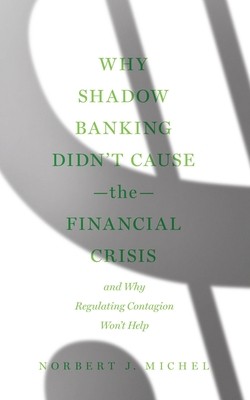
- We will send in 10–14 business days.
- Author: Norbert J Michel
- Publisher: Cato Institute
- ISBN-10: 1952223474
- ISBN-13: 9781952223471
- Format: 12.7 x 20.3 x 0.8 cm, minkšti viršeliai
- Language: English
- SAVE -10% with code: EXTRA
Why Shadow Banking Didn't Cause the Financial Crisis (e-book) (used book) | bookbook.eu
Reviews
Description
Most American adults easily recognize the following description of the 2008 financial crisis. Unregulated Wall Street firms (so-called shadow banks) made too many risky bets with derivatives, causing the housing bubble to burst. The contagious run through the financial system was only arrested by bailouts from the federal government and major regulatory changes. But what if the record demonstrates that the core of this story is misleading and the resulting regulations are misguided?
Now, almost 15 years later, the Biden administration is using this same story to promote more regulations for money market mutual funds (a key part of the supposedly dangerous shadow banking system) and even to justify allowing only federally insured banks to issue stablecoins (a type of cryptocurrency that didn't exist in 2008). But most of the post-2008 regulatory efforts were concentrated in the traditional banking sector-not the shadow banking sector-which warrants skepticism toward the conventional story of the 2008 crisis and any new regulations based on that story.
This new book from explores the main problems with the conventional story about the 2008 crisis and explains why it does not justify expanding bank-like regulations throughout financial markets to mitigate systemic risks.
- Author: Norbert J Michel
- Publisher: Cato Institute
- ISBN-10: 1952223474
- ISBN-13: 9781952223471
- Format: 12.7 x 20.3 x 0.8 cm, minkšti viršeliai
- Language: English English
Most American adults easily recognize the following description of the 2008 financial crisis. Unregulated Wall Street firms (so-called shadow banks) made too many risky bets with derivatives, causing the housing bubble to burst. The contagious run through the financial system was only arrested by bailouts from the federal government and major regulatory changes. But what if the record demonstrates that the core of this story is misleading and the resulting regulations are misguided?
Now, almost 15 years later, the Biden administration is using this same story to promote more regulations for money market mutual funds (a key part of the supposedly dangerous shadow banking system) and even to justify allowing only federally insured banks to issue stablecoins (a type of cryptocurrency that didn't exist in 2008). But most of the post-2008 regulatory efforts were concentrated in the traditional banking sector-not the shadow banking sector-which warrants skepticism toward the conventional story of the 2008 crisis and any new regulations based on that story.
This new book from explores the main problems with the conventional story about the 2008 crisis and explains why it does not justify expanding bank-like regulations throughout financial markets to mitigate systemic risks.


Reviews